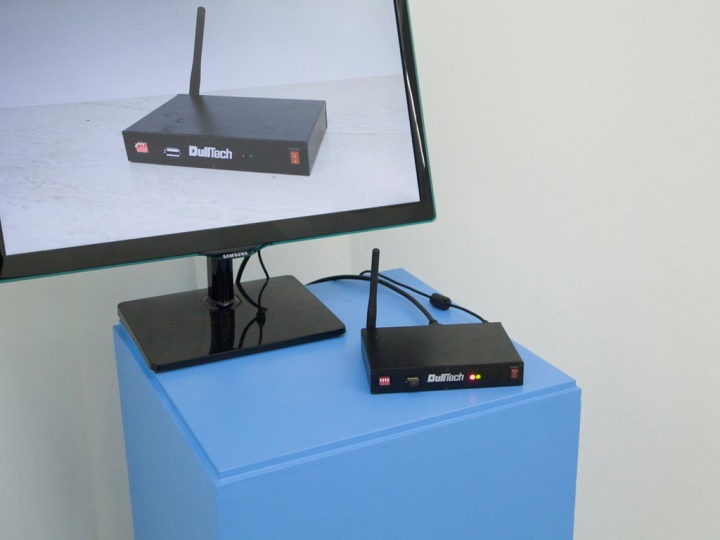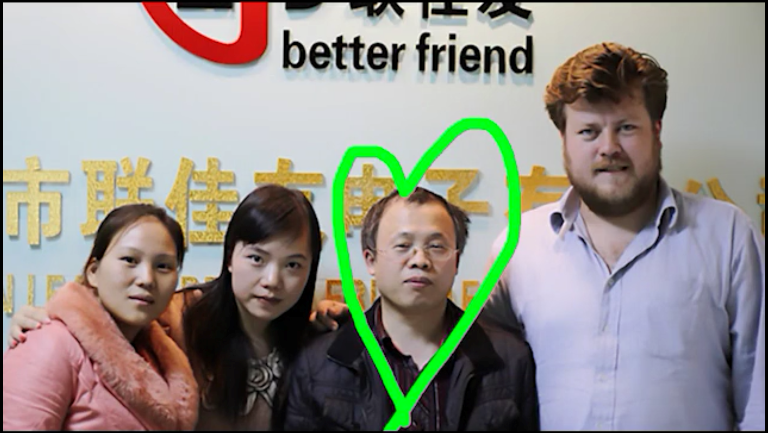
Earlier this month, the artist and DullTech CEO Constant Dullaart launched a Kickstarter to crowd-source the company's first product. The DullTech media player is a product that promises to simplify the installation of single- and multi-channel video work. The device works by playing and looping the first video file found on a USB-drive on any monitor or television without concern for file format, remote controls, or syncing screens. Considering the artist's previous works, which often focused on the conditions of art viewership within online networks and galleries, the concept for this device is both humorously apt and much-needed to solve the hassles of installation.
Those who I have spoken with outside of the arts, however, have raised doubts concerning the ethics of the Kickstarter campaign and the product. Dulltech began while the artist was on a 2012 residency in Shenzhen, South China, a region known as "The Silicon Valley of Hardware." At that time, the company and product were a way for the artist to get into to an original equipment manufacturer (O.E.M.) to see the working conditions of Chinese laborers. After artists expressed excitement about the convenience of the product, Dullaart and his colleagues decided to go into actual production with the factory. Though the O.E.M. Dullaart used for this project, the Taiwanese manufacturer RealTek, does not have any reported violations, mentioning Chinese labor often elicits discomfort due to the 2010 suicides at Foxconn's Shenzhen factory and several reports by the Institute for Global Labour and Human Rights and other watchdog organizations concerning working conditions, employee exhaustion, and contract terminations due to work-related illness.
DullTech's Kickstarter video
By highlighting the incongruity between clean digital branding strategies and depictions of the manufacturing labor that enables them, the DullTech Kickstarter video baits this response. Produced for under $200 through the website Fiver, the video abruptly contrasts sharpie-drawn cartoons of white people assembling puzzle pieces (depicting the product's concepts) with photographs of the O.E.M.'s workers and engineers as well as e-waste and the smog-filled landscape of Shenzhen; the perky, jargon-filled narration and a ukulele and glockenspiel soundtrack only heighten one's feeling of disquiet.

The DullTech media player
On account of this response, one is left to consider the relationship between digital artists and the conditions of global labor. In McKenzie Wark's 2014 essay "Designs for a New World," the author stresses that artists, as hackers, are able to desegregate the division between their practices and other forms of labor, citing the protests of Google buses and Andrew Norman Wilson's video essay "Workers Leaving the Googleplex." For Dullaart, however, gaining access even to view the conditions of labor means operating within its stratification as a business. Similar to other migrant laborers in the region, those who Dullaart and his colleagues interviewed prior to contracting the O.E.M. came from rural areas in China to Shenzhen because of their desire to be middle class, the higher wages available compared with local agricultural labor in their hometowns and the factory's provision of room and board as well as some benefits. Despite the unsettling reaction to Chinese factories, when one criticizes the product for using the labor in Shenzhen, one also criticizes the products that form the infrastructure of the web. 90% of the world's electronics are produced in the region, and, as the Guardian put it, "the phones that fuelled the Arab spring were soldered in the back streets of Shenzhen."

Dullaart with enginer "Eagle" who developed the DullTech media player
In addition to being a convenient product that "just works," because of Dullaart's documentation of the manufacturing process in his sales pitch, the DullTech video and product bring the conditions of the modern factory into the economies of creative digital production, highlighting the dependence on this type of labor shared by artists, the white cube, and Kickstarter itself. In so doing, it points out a disconcerting double bind: the ability to observe and critique this process seems to belong solely to those who enable it.
The DullTech Kickstarter campaign ends tomorrow. To enable it, pledge here.
 DullTech Kickstarter video still
DullTech Kickstarter video still

